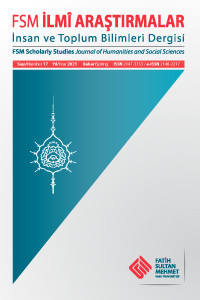Uluslararası Hukukta İnsani Müdahale ve Hukuki Meşruiyet Sorunu
Güvenlik Konseyi; İnsani Müdahale; Uluslararası Barış; İnsan Haklarının Korunması
The Question of Humanitarian Intervention in International Law and the Problem of Legitimacy
The Security Council; Humanitarian Intervention; International Peace; Human Rights Protection,
___
- Alston, Philip, “The Security Council and Human Rights: Lessons to be Learned from the Iraq Kuwait Crisis and its Aftermath”, in: Australian Yearbook of International Law, Bd. 13, 1990/91, s. 107-176.
- Bilder, Richard B., “Kosovo and the “New Interventionism”: Promise or Peril?”, JTLP, 9, 1999, s. 153.
- Bothe, Michael/Martenczuk, Bernd, Die NATO und die Vereinten Nationen nach dem Kosovo-Konflikt - Eine völkerrechtliche Standortbestimmung, Vereinte Nationen, 1999, s. 125.
- Cassese, Antonio, International Law, Oxford, New York, 2001.
- Fink, Udo, Kollektive Friedenssicherung. Kapitel VII UN-Charta in der Praxis des Sicherheitsrates der Vereinten Nationen, Frankfurt a.M./Berlin/Bern/ New York/Paris/ Wien, 1999.
- Frowein, Johan/Krisch Nico, Kommentierung zu Art, 39-42 ChVN, in: Simma, Bruno (Hrsg.): Charta der Vereinten Nationen Kommentar, München 1991.
- Heinz, Ursula/Philipp, Christiane/Wolfrum, Rüdiger, Zweiter Golfkrieg, “Anwendungsfall von Kapitel VII UN-Charta”, Vereinte Nationen, 39, 1991, s. 121 vd.
- Henkin, Louis, “Kosovo and the Law of Humanitarian Intervention”, AJIL, Vol.93, 1999, s. 824 vd.
- Herdegen, Mattihas, Völkerrecht, München, 2010.
- Ipsen, Knut, Völkerrecht - Ein Studienbuch, 1999.
- Kaelin, Walter, “Humanitäre Intervention: Legitimation durch Verfahren? Zehn Thesen zur Kosovo-Krise”, SZIER, 2000, s.159.
- Kimminich, Otto, “Der Mythos der humanitaren Intervention”, in: Archiv des Völkerrechts, Bd. 33, 1995, s. 430-458.
- Koskenniemi, Martti, “‘The Lady Doth Protest Too Much’ - Kosovo, and the Turn to Ethics in International Law”, The Modern Law Review, 65, 2002, s. 159.
- Kritsiotis, Dino, “The Kosovo Crisis and NATO’s Application of Armed Force Against the Federal Republic of Yugoslavia”, ICLQ, 49, 2000, s. 330.
- Lailach, Martin, Die Wahrung des Weltfriedens und der internationalen Sicherheit als Aufgabe des Sicherheitsrates der Vereinten Nationen, Göttingen, 1998. Lange, Christian, “Zu Fragen der Rechtmaessigkeit des NATO-Einsatzes im Kosovo”, EuGRZ, 26, 1999, s. 313.
- Malanczuk, Peter, Humanitarian intervention and the legitimacy of the use of force, Amsterdam, 1993.
- Momtaz, Djamchid, “NATO’s “Humanitarian Intervention” in Kosovo and the Prohibition of the Use of Force”, RevICR, 837, 2000, s. 89.
- Pease, Kelly Kate/Forsythe, David P, “Human Rights, Humanitarian Intervention and World Politics”, Human Rights Quarterly, 15, 1993, s. 290.
- Preuss, Ulrich K., Zwischen Legalitaet und Gerechtigkeit. Der Kosovo-Krieg, das Völkerrecht und die Moral, Blaetter für deutsche und internationale Politik, 1999, s. 816.
- Randelzhofer, Albrecht, “Kommentierung zu Art”, 2, (4) und 51 ChVN, , in: Simma, Bruno (Hrsg.), Charta der Vereinten Nationen Kommentar, München, 19 Randelzhofer, Albrecht, Neue Weltordnung durch Intervention, in: Wege und Verfahren des Verfassungslebens, in: Badura, Peter/Scholz, Rupert (Hrsg.), Festschrift für Peter Lerche zum 65, Geburtstag, München, 1993, s. 5l.
- Schaefer, Andreas, Der Begriff der Bedrohung des Frieneds in Artikel 39 der Charte der Vereinten Nationen, Frankfurk, 2006.
- Schreuer, Christoph, Diskussionsbeiträge, in: Jost Delbrück (Hrsg.), Allocation of Law Enforcement Authority in the International System, Veröffentlichungen des Instituts für Internationales Recht an der Universität Kiel, Bd. 117, Berlin 1994, s 82-85 ve 160-162.
- Simma, Bruno, Die NATO, die UN und militärische Gewaltanwendung: Rechtliche Aspekte, in: Merkel, Reinhard, Der Kosovo-Krieg und das Völkerrecht, Frankfurt a.M., 1999, s.9.
- Stein, Torsten/von Buttler, Christian, Völkerrecht, Köln/München, 2009.
- Thürer, Daniel, “Der Kosovokonflikt im Lichte des Völkerrechts: Von drei echten und scheinbaren - Dilemmata”, AVR, 38, 2000, s.1.
- Thürer, Daniel, “Der Wegfall effektiver Staatsgewalt: The Failed State, in: Der Wegfall effektiver Staatsgewalt: The Failed State”, BDGV, Band 34, 1996, s.9.
- Wolfrum, Rüdiger - Heinz, Usula - Philipp, Christiane - Golfkrieg Zweiter, Anwen- dungsfall von Kapitel VII der UN-Charta, in: Vereinte Nationen, 1991, s. 121128 (alıntı: Wolfrum/Heinz/Philipp).
- Wedgwood, Ruth, “NATO’s Campaign in Yugoslavia”, AJIL, Vol. 93, 1999, s. 8
- Wellhausen, Malte, Humanitaere Intervention, Baden-Baden, 2002.
- Wilms, Heinrich, Der Kosovo-Einsatz und das Völkerrecht, in: Zeitschrift fur Rechtspolitik, 1999, s. 227-230.
- ISSN: 2147-3153
- Başlangıç: 2012
- Yayıncı: Fatih Sultan Mehmet Vakıf Üniversitesi
Türk Edebiyatında Edebiyat Kanonu: Kanon, Kanona Girmek ve Kanona Müdahale
Metnin Hız®ı: Erdem Bayazıt’ın Şiirlerinde Anlam ve Anlatım Gücü
Margarete I. Ersen-Rasch, Türkische Grammatik: Ausführlich und Verständlich – Lernstufen A1 bis C2
F. Nihan Ketrez, A Student Grammar of Turkish
Uluslararası Türkçenin Batılı Elçileri Sempozyumu
Örtüsüz Gerçeklik: Wassily Kandinsky’nin Yeni Realizmi
Aynanın Sırrı: Mustafa Kutlu Sempozyumu
Stanisław Stachowski, Lexique turc dans le Vocabulaire de P. F. Viguier (1790)
